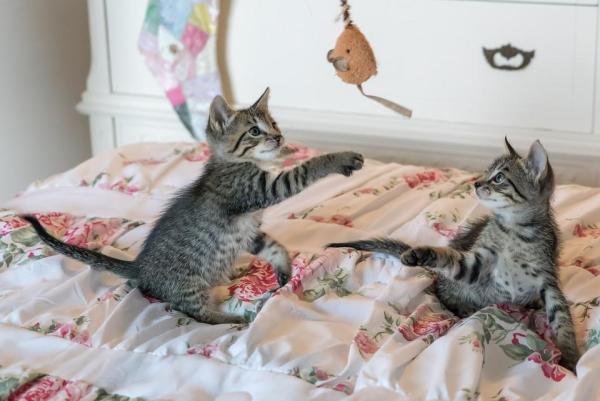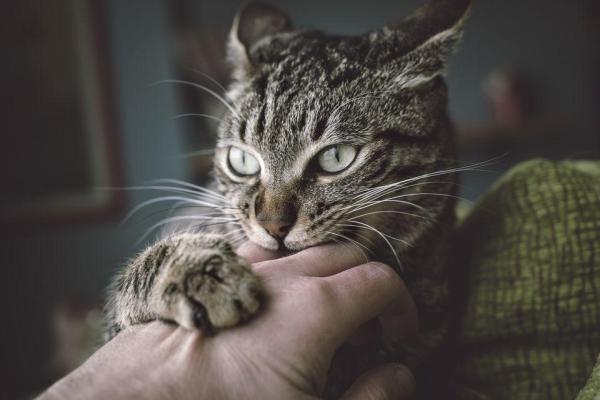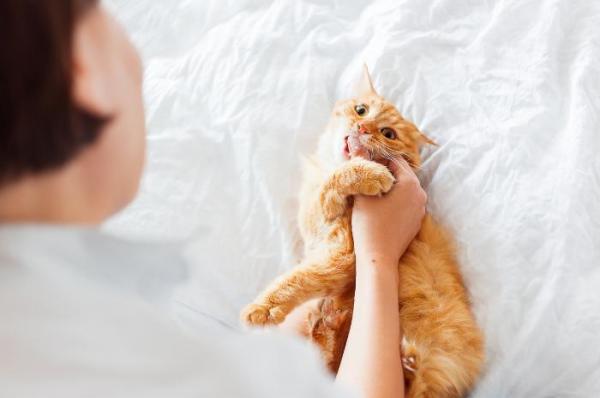Why Does My Cat Bite When I Pet Them?



See files for Cats
Any cat owner will be aware that felines like their independence. Unlike dogs, they are solitary animals in the wild. This doesn't mean they don't require socialization, but it does mean it's not unusual for them to spend most of the day outside and barely greet you when they return. On the contrary, come cats can be very affectionate. We probably wouldn't want a pet in the first place if it didn't give us some love.
Sometimes, however, we can get very mixed signals from our cats. They are the ones who want some pets and cuddles. We give them the tickle under their chin they enjoy, the belly scratches they love, then all of a sudden they reach up and bite us. If you are wondering why does my cat bite me when I pet them?, AnimalWised delves into the mystery to explain some basic cat behavior as well as when to know there might be trouble.
When biting is a game
As we know, cats are natural hunters. Even domesticated kitties will stalk objects and indulge their wild side when they see an insect scuttle across the floor. They even stalk and play fight with their siblings while kittens to hone these innate skills. Biting is a big part of these games and knowing what is appropriate and what is not will take time.
This is why socialization is so important in these early stages of life. During the first two months, a lot of this will have to do with how they interact with their mother and siblings. Their mother's influence is so important as, like any good parent, they will intervene to keep them in line. This really helps for a cat to understand their bite inhibition.
When a kitten is welcomed into our home, he may want to repeat these games with its new family (i.e. us and any other pets we may have). This can explain why our cat bites us when we pet them as they are in a ‘hunting game’ mode. It doesn't mean they don't like us or are trying to show aggression, it is the opposite. They are treating us like family. Unfortunately, they also see our hands, arms, toes and almost anything as fair game, so we need to exercise caution and not encourage bad behavior either.

Biting as warning
It is not uncommon for our cats to come up to us and rub their heads and body against our legs. They may be purring and showing affection towards us, whether they just want company or are in need of something. It is normal to want to reach down and give them a pet, which is why it can be quite shocking that they snap, swipe or bite us when we do so.
It's important to understand that, although they are coming for attention, their own attention spans can be quite short. Their capricious interest means one second they are your best friend, the next they are biting you to show they want to be left alone. These bites when we pet our cat is a small warning, simply telling us that we don't want to be touched.
It is also possible, if not likely, that your cat bites or claws you when you pet them because you haven't accurately read their signs. These may include the following:
- Ears folded back so they lay closer to their head and they twitch with our contact.
- Restless movement of the tail which they present elevated.
- Attempt to get away from us.
- Shows an agitated state in general or heightened alertness.
If we see these signs, it is important to stop trying to pet them. If we don't it may result in a bite or a blow. This is a miscommunication on our part, not on theirs.
Areas to pet
Firstly, with a cat or with any animal, we should not force petting. We can approach them appropriately, but if they show hesitance then we shouldn't try to make them do something they are uncomfortable with. Instead, we should let them come to us. Not obliging them can explain why they scratch or bite in the first place.
If you observe your cat, it is easy to see they are showing affection by rubbing against us, especially if they nuzzle with their head. When they do this they are releasing some appeasing hormones which can provide a pleasant sensation. This is why petting them on their heads is one of the most rewarding for them.
Different cats will respond more positively or negatively to places being petted on an individual basis. Generally, however, there are some trends:
- Top of head and neck: this area, similar to the side of the face, is very receptive to our petting. Our cat will usually accept the contact willingly, but it is important to remember to stop as soon as they show us some discomfort.
- Back: petting, stroking and scratching down the length of a cat's spine can elicit some of the most satiated purrs. We can even gently tickle the base of the tail, but not all cats may like this.
- Paws: cats do not enjoy having their paws or foot pads touched. This is something to avoid, especially with cats we don't know. It is probably due to the sensitivity of a cat's paw, just as you might feel if someone tickled under your foot.
- Belly: for many cats, this is a danger zone in terms of petting. Even the most affectionate of cats can react badly if petted in this place. Similar to their feet, the belly is a place of vulnerability. They may feel like they are being attacked and can bite as reaction. Since your hand is in this area, they can also wrap their claws around you and give you some nasty scratches if you're not careful.
It is important to respect your cat and their personal space. This is especially so if it is a cat we are meeting for the first time. Start little by little and gauge their responses, stopping at the first sign of discomfort.

The love bite
Unfortunately, cats are not always as direct in their communication. Sometimes, their bite in itself may be a sign of affection. This can be confusing, but there is an essential difference between this and an aggressive act. They will take our hands, fingers or even face and give them a soft bite. These bites are generally ‘without teeth’ and there will be no attempt to break the skin. They might also wrap their paws around you and nuzzle at the same time. Unfortunately, if a cat has not properly learned its bite inhibition, they can get overzealous and bite harder than they think. However, if their bites are not damaging, all you need to do is be relaxed and friendly.
When the bite is dangerous
In some cases, as close as our relationship may be, a cat's bite may have dangerous implications. As we don't speak a direct language, it can be hard to sense exactly their mood or their feelings towards us. This is especially so if they have been outside where something we haven't observed has happened. When this happens, the cat will not tolerate petting. It can be exacerbated if they feel like they are being cornered and feel as if they can't escape.
Often, this situation is when the cat is in a state of fear rather than aggression. If they are in this state regularly, it is usually a sign of poor socialization or a past trauma. This is why it is important to respect their distance and the cat's own boundaries. We shouldn't force contact or reprimand them if they do lash out. In this instances, it is important to start calmly. Here is a short guide:
- Let the cat come to us, perhaps enticing them with a toy or treat to make them feel at ease.
- Stroke gently and slowly with no sudden movements. Start at the sides of the top of the head and don't push it. If the cat is receptive, then we can increase the petting, but don't try to do too much too soon.
- Once they have started to accept these small pets, then you can start to move down their back and see if they will respond positively to this as well.
- We also need to remember that a cat may want to sleep in our lap or knead us without being petted at all. If this is the case, you should respect their boundaries.
If however, an attack is triggered by trying to pet a cat, here are some steps to try:
- If the cat grabs and tries to capture our arm, it is important to remove it firmly, but do not jerk it suddenly as this can increase the aggression. You can firmly say ‘no’, but don't lose your head.
- Never attack or strike the cat in retaliation. Apart from being a form of animal abuse, it will only result in another attack back. We will also be teaching them that we are untrustworthy and can ruin our entire relationship. This is a much harder problem to solve and is not worth losing your temper. It's certainly not worth causing your pet any pain.
- If none of the above approaches work, then we may be dealing with a cat which is in need of some outside help. If this is the case, then we need to visit a veterinarian or ethologist. A professional who studies animal behavior should be able to inform you where you are going wrong and find ways to make them more comfortable with you. It will usually involve assessing any stressors in your cat's life and removing them as well as showing them how to play properly.

If you want to read similar articles to Why Does My Cat Bite When I Pet Them?, we recommend you visit our Facts about the animal kingdom category.









